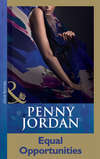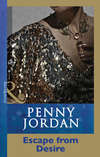Buch lesen: «Equal Opportunities»

Celebrate the legend that is bestselling author
PENNY JORDAN
Phenomenally successful author of more than two hundred books with sales of over a hundred million copies!
Penny Jordan’s novels are loved by millions of readers all around the word in many different languages. Mills & Boon are proud to have published one hundred and eighty-seven novels and novellas written by Penny Jordan, who was a reader favourite right from her very first novel through to her last.
This beautiful digital collection offers a chance to recapture the pleasure of all of Penny Jordan’s fabulous, glamorous and romantic novels for Mills & Boon.
About the Author
PENNY JORDAN is one of Mills & Boon’s most popular authors. Sadly, Penny died from cancer on 31st December 2011, aged sixty-five. She leaves an outstanding legacy, having sold over a hundred million books around the world. She wrote a total of one hundred and eighty-seven novels for Mills & Boon, including the phenomenally successful A Perfect Family, To Love, Honour & Betray, The Perfect Sinner and Power Play, which hit the Sunday Times and New York Times bestseller lists. Loved for her distinctive voice, her success was in part because she continually broke boundaries and evolved her writing to keep up with readers’ changing tastes. Publishers Weekly said about Jordan ‘Women everywhere will find pieces of themselves in Jordan’s characters’ and this perhaps explains her enduring appeal.
Although Penny was born in Preston, Lancashire and spent her childhood there, she moved to Cheshire as a teenager and continued to live there for the rest of her life. Following the death of her husband, she moved to the small traditional Cheshire market town on which she based her much-loved Crighton books.
Penny was a member and supporter of the Romantic Novelists’ Association and the Romance Writers of America—two organisations dedicated to providing support for both published and yet-to-be-published authors. Her significant contribution to women’s fiction was recognised in 2011, when the Romantic Novelists’ Association presented Penny with a Lifetime Achievement Award.
Equal Opportunities
Penny Jordan

CHAPTER ONE
‘WHAT exactly do you mean, it’s too late to claim the child?’
David Wilder glanced apprehensively at his extremely grim client. He had been warned when he joined the prestigious city law firm of Rainer, McTeart and Holston that some of their clients were very demanding indeed, with exacting standards and sometimes very strong and unfortunately erroneous views about their rights under British law.
‘Unfortunately we do number among our clients a few who do not yet seem to be aware that there are some things that money just cannot buy,’ the senior partner had told him.
The senior partner was also his godfather, which was how he had come to join the practice in the first place; a relationship which he suspected was not going to protect him at all when the full wrath of the man standing opposite him burst upon his head.
He had acted for the best, he reflected miserably. A minor matter was how the senior partner had described the whole affair: something that need not concern their prestigious client, who was, in any event, out of the country on business at the time. Besides, the woman had already made it clear that she would take charge of the child. How was he supposed to know that Garrick Evans would want the child himself?
It was not, after all, as though there was anything other than the most tenuous of blood ties between them; the son of his deceased second cousin.
‘What do you mean, it’s too late?’ Garrick Evans demanded, repeating his earlier question. The lowered volume of his voice in some odd way added to its menace.
He was a tall man, a good two inches over six foot, with a frame that reminded David Wilder of his school days and the torments of the rugby field. He himself was of a much slighter built, and he gave an inward shudder at the very hardness of the other man. Garrick Evans was well into his thirties, and yet there was an air of honed fitness about him that suggested that he did not spend all his time poring over balance sheets and negotiating deals. But to read the financial press one would think that he did.
“One of the most important power brokers of our time,” was how the Financial Times had described him, and in doing so had coined a new phrase. A power broker was exactly what Garrick Evans was: a man whose skills in assessing the weak points of an institution and then turning them to either his own or his clients’ advantage were so notorious that it was said in the city that whole boards quailed at the sound of his name.
A millionaire before he was thirty, he no longer spent his time buying and selling vast corporations, but instead used his skills on a consultancy basis, normally working for governments or very large corporations. He also gave a great deal of his time to ensuring the profitable running of several large charities—time which he gave free of charge, although very few people knew it.
Garrick Evans had learned a very long time ago that to show people a weakness was to invite them to take advantage of it.
David Wilder cleared his throat and looked nervously into the cold grey eyes of his client.
‘Well…that is…Well, the fact is that by declaring that you were abdicating from any responsibility toward the child, you have also given up any rights you might have had over him.’
‘I?’ Garrick queried drily. ‘Odd…I don’t seem to remember making such a momentous decision.’
‘Well, no. You were out of the country at the time, in Venezuela, I believe. You may remember you had given strict instructions that you were only to be contacted in an emergency.’
‘I see. And you, of course, didn’t consider that the death of my cousin and his wife was an emergency. Is that it? Never mind the fact that my cousin has named me as co-guardian of his child.’
‘He was only your second cousin,’ David muttered helplessly. ‘There had been no contact between you as far as we knew.’
He didn’t add that the whole office knew of his well-documented loathing of hangerson of any kind, and it was for that reason that David had assumed that he wouldn’t want the child.
‘So, there was an error of judgement. Now what we have to do is to correct that error. Have you been in touch with the woman? What’s her name?’
‘Kate Oakley,’ David supplied for him, admitting, ‘Well, no, not yet. We weren’t sure what your instructions were going to be.’ He cleared his throat nervously again. ‘You see, it would be very difficult now to reclaim the child. We would have to prove negligence on the part of your co-guardian. And here, the mere fact that she’s a woman, and you’re a man, would immediately balance these scales in her favour…We could try to negotiate, of course.’
He said it so doubtfully that Garrick frowned.
‘How much do you know about her?’ he questioned abruptly.
Silently, David Wilder handed him a file.
‘Let me read this and then I’ll come back to you. In the meantime, don’t do anything. If I think it necessary, I’ll go and see Miss Oakley myself. It may be that I will be able to persuade her to see the advantages of the child’s coming to me,’ he said grimly.
A few hours later, when David Wilder was relating the story to his wife while she was preparing dinner, she turned her head and said thoughtfully, ‘Buy her off, did he mean?’
David winced, but admitted that it was a strong possibility.
‘Well, I hope she turns him down,’ Elaine told him roundly. ‘That poor baby…What on earth does he want it for, anyway? He doesn’t strike me as a man who would want to take on such a responsibility. Heavens, he’s never in one place long enough to bring up a child.’
‘He wants an heir, I suppose,’ David told her.
‘Oh, I see, and rather than go to the trouble of finding himself a wife, he’s decided he’d prefer to take on a ready-made son without the nuisance of a woman who might make emotional and financial demands on him. Typical! Just the sort of thing I would have expected from a man like him,’ she said scathingly.
David patted his wife’s hand, and put her outburst down to the fact that she herself was four months pregnant with their first child, a very emotional time for a woman, but of course there was a thread of truth in Elaine’s argument.
Despite the fact that over the course of the years Garrick Evans had had several long-standing relationships with women, it was rumoured that he always made it plain to them that they could forget marriage. A hard man. A man it would be very difficult to get to know. A man who wore an air about him of always getting what he wanted. And what he now wanted was a nine-month-old boy, currently living with his guardian; a woman who, according to her file, was an orphan herself, without either wealth or family to support her.
Even if she wanted to keep the child, she would never be able to stand out against Garrick. Feeling rather sorry for her, David Wilder applied himself to his dinner.
Not all that very far away from the elegant terraced house which had been Elaine Wilder’s parents’ wedding gift to her and her husband, Kate Oakley sat cross-legged on her sitting-room floor, the telephone receiver jammed into the crook of her neck while she painted her nails with her free hand.
Her house, although not in as fashionable part of London as the Wilders’, was every bit as elegantly decorated and furnished. As a PR consultant running her own business, Kate was well aware of the importance of creating the right image; hence the nail polish.
She finished one hand and studied the effect with a frown, while listening to her friend exclaiming in amusement.
‘Kate…you with a nine-month-old baby! This I have to see. How in the world are you managing?’
‘I’m not,’ Kate told her firmly. ‘That’s why I’m ringing you. In the last six weeks I’ve gone through four supposed nannies, Camilla. It can’t go on. I came in tonight all set to go out to dinner with James, only to discover the latest one waiting for me with her bags packed.’
‘Good heavens! Is the child so difficult, then?’
‘No, not at all. If anything, he’s inclined to be too subdued. The shock of losing his parents, poor little thing…No, the problem is me. Three nights this week, I haven’t managed to get in until gone ten at night. Everyone the agency has sent me expects to work a regulation seven-hour day; they don’t like being alone all the time with Michael; they don’t like the fact that I can’t provide them with a private sitting-room and a whole host of other luxuries, and as for their salaries—’ She gave a groan. ‘The agency is starting to do quite well, but not that well.’
She didn’t want to tell Camilla what a struggle it had been even for her to afford the new house. Up until the arrival of small Michael into her life, she had lived in a flat, but she had strong views on how a child should live, and those did not include being cooped up with no outside area to play in. The reason she had bought this particular house had been because of its walled-in back garden.
Admittedly it wasn’t very large, but it was certainly large enough for a small boy to vent his energy in. Of course, she was looking ahead. Michael was only nine months old, but in another couple of years…
‘I see. I sympathise, my dear, but why have you come to me?’
‘Oh, come on, Camilla. You know everyone there is to know in London. If anyone can help me, it’s you. You must know where I can find a reliable nanny who isn’t going to cost me the earth…’
It was so unusual for her friend to sound so exasperated that Camilla frowned and stopped doodling on her notepad.
She had known Kate for almost ten years. In fact, Kate had worked for her when she first came to London. Camilla had sold out her interest in her own PR firm several years ago, and now spent all her time helping her husband in his own business and looking after their twin daughters. She was proud of Kate’s success and drive, feeling that she had been the one responsible for recognising and nurturing them, and she sympathised with her in her present dilemma.
She and her husband had only just returned from a six months’ working visit to New York, and this was her first real opportunity to catch up with her friend’s life.
‘I think you’d better start at the beginning and tell me the whole story,’ she suggested firmly. ‘Apart from a frantic message on my answering machine, I know nothing whatsoever about this baby who suddenly seems to have taken over your life. He’s not yours, of course…’
‘No,’ Kate agreed quietly, adding, ‘He’s my godson.’
Start at the beginning, Camilla had said, but she didn’t want to. She had put those years at the orphanage and all the insecurities that went with them firmly behind her now, hadn’t she?
‘His parents were killed in a car crash. Neither of them had any close family.’
‘No one? But, Kate, surely…’
‘Alan has a second cousin, but they rarely met.’ She said it in such a clipped voice that, even without seeing her, Camilla could sense her friend’s reluctance to discuss what had happened. Kate could be like that at times, erecting fences behind which she quietly disappeared. They had known one another a long time, and yet Kate rarely talked about her past.
Camilla knew better than to press her now, saying merely, ‘I see. So there’s no question of you—er—handing over the responsibility of this baby to someone else?’
‘No!’ Kate told her explosively, and then, realising how much she had betrayed, felt obliged to explain reluctantly, ‘I can’t do that, Camilla…I can’t explain it to you, but I feel I owe it to Jennifer, his mother, to bring Michael up myself. You see, I know she’d want him to have all the things that she and I didn’t have. A real home life..she and I didn’t have. A real home life…family…’
Abruptly Kate stopped. Already she had betrayed too much, revealed too much, and she started to shake a little as she clutched the receiver. This was the reason she hated to discuss the past: it opened up too many vulnerable areas, too many heartaches that had never properly healed.
‘I see,’ Camilla said compassionately. ‘Well, my dear, there’s only one way to do that, isn’t there? You will have to find yourself a husband.’
There was a short silence, and then Kate said harshly, ‘You know my views on marriage, Camilla. I’m a career woman who wants to earn her own security, not to receive it secondhand from a man who would walk out of my life whenever he chose.’
‘Oh, Kate.’ Camilla could have wept for her. Where did it come from, this deep, abiding fear of depending on anyone other than herself that made Kate so terrified of emotional commitment? Independence was fine, but it could be carried to extremes. ‘Kate, marriage needn’t be like that,’ she protested quietly. ‘Husband and wife can be equal partners, each loving and respecting the other…each mutually dependent on the other…’
‘Perhaps,’ Kate agreed after a long pause. ‘But it isn’t a risk I want to take.’
‘Well, then, your next best alternative is to follow the example of someone like Britt Ekland, and hire a male nanny,’ Camilla told her.
‘A what?’
‘A male nanny,’ Camilla repeated patiently. ‘They do exist, I promise you, and marvellous they are too, by all accounts. You’d be surprised how many single working mothers employ men to take care of their children, especially when they’re boys. Male patterning and all that. And apparently it works. There’s also the added advantage that there’s less jealousy between Mum and nanny when she’s a he, if you know what I mean. Less feeling that somehow or other someone else is taking your place with the baby.
Look, I know an agency that specialises in finding male nannies. Why don’t I give them a ring on your behalf and see what they can come up with?’ she suggested.
A male nanny! Kate frowned. Did she really want a strange young man sharing her home?And yet the suggestion had its good points. She had been conscious of rather more than mere covert disapproval from a couple of the girls she had been employing, as though they felt that she was somehow not doing her best for Michael by going out to work, and yet what alternative had she? If she didn’t work, she could not support herself. She had no money, no family, nothing to fall back on other than her own skills in the workplace.
‘Look, give it a try,’ Camilla urged her. ‘What have you got to lose? I’ll give the agency a ring, get them to send someone round, and if you don’t like them…Well, there’s nothing lost, is there?’
‘All right,” Kate agreed hesitantly. From upstairs she caught the sound of a small, fretful wail. ‘I’ll have to go. Michael’s just woken up.’
‘OK. Leave everything to me. I’ll sort something out. Oh, and by the way, how are you getting on with James?’
James Cameron owned, among other things, a chain of supermarkets spread throughout the country, and through Camilla’s good offices Kate had got the opportunity to take over his PR work. The supermarkets, for one reason or another, did not have a good image, and if Kate could get the contract to change this it would be a very healthy boost to her profits.
‘He’s taking me out to dinner next week. I’ve got to prepare a couple of presentations for him. He wants to start going up-market with the supermarket acquisition.’
‘Watch out for him, Kate,’ Camilla warned. ‘He regards himself as something of a stud.’
‘Don’t they all?’ was Kate’s grim response, and Camilla sighed at her tone of voice.
‘Some do,’ she admitted, ‘but there are others. Men who like and respect women as well as desire them. The problem with you is that because you prefer to think that all men are like the Jameses of this world, you deliberately close your eyes to the existence of the other sort. I’ve often wondered why.’
‘It’s safer that way,’ Kate told her, and then stopped abruptly. She was giving too much away. Betraying more about herself than was wise. Good friend though Camilla was, if she were to learn of Kate’s fear of committing herself emotionally to someone, and through that commitment being hurt as she had been hurt as a child, Camilla would, for the very best of reasons, try to change her outlook. And she didn’t want her outlook changing. She felt safer with it the way it was.
Their conversation over, she went upstairs and walked into Michael’s bedroom, switching on the light. She had purposefully put a soft light in this room, so that no brightness would distress the baby.
Michael had been premature, and was still slightly small for his age. He was wide awake and not crying now that he saw her. As she reached down into the cot, he raised his arms to her.
Kate picked him up, and comforted him automatically. She felt the dampness of his mouth where he sucked her shoulder and her silk shirt. Damn! She normally changed when she got home from work, but tonight, what with the rumpus with the nanny, she hadn’t had time.
He had thrown off his blankets and his hands felt cold. She reached down into the cot and picked one up, wrapping him securely in it. Thinking he was going to be put down, he started to cry, his small features puckering.
The social worker who had interviewed her following Alan and Jen’s deaths had warned her that for some considerable time Michael was going to feel insecure. So far this insecurity had manifested itself in bouts of tears in the middle of the night which had necessitated Kate getting up to take the baby into her own room, while his nanny slept on, apparently undisturbed by the noise.
Years of living with small children had given Kate an expertise she had not even realised she possessed until Michael came into her life. She was half appalled by her own inherent skill in looking after him, at least physically. Emotionally, she wasn’t anything like as sure that she would be able to cope with his needs.
She adjusted her stance to cope with his weight with an expertise that would have astounded most people who knew her, easily rocking her body so that its rhythm soothed his whimpers.
The tears had stopped now, but she knew from experience that the moment she tried to put him back in his cot they would start again; it was all too understandable, really, this defiant bid to claim her attention.
None of the nannies she had had so far had been pleased by her ruling that Michael was to remain upstairs. The house was only small, and the sitting-room and dining-room she had had so carefully furnished sometimes had to double as an extension of her office.
Clients sometimes visited her at home; she entertained them at small, elegant dinner parties, using the recipes she had carefully and meticulously learned at nightschool. She wasn’t an inspired cook, but she had the intelligence to realise that every tiny skill she added to her repertoire increased her chances of ultimate success.
A male client, dubious about dealing with one of the new breed of city career woman, could have his fears soothed by the production of a delicious home-cooked meal, thus restoring his innate belief that women, even career women, enjoyed pandering to men. It was because she had to look upon her sitting-room and dining-room as extensions of her office that Michael was barred from them. A scatter of toys and baby things, no matter how domestic, would not serve to enhance the image she was careful to project.
Instead she had given Michael the largest of the three bedrooms, and what was more she had decorated it herself—another learned skill.
Nor could she simply abandon her responsibility to him. Jen had been as close to her as if they were sisters. Closer in some ways. And she owed it to her friend to do the very best she could for Michael.
It would be easier once he was old enough to go to school…once she had her business firmly established. Already it was doing well, but not well enough for her to be able to sit back and relax. She would just have to hope that Camilla came up with someone suitable.
Michael was asleep…Very gently she removed him from her shoulder and walked over to the cot. Before she got there, he was awake, blue eyes regarding her with solemn regard, the baby mouth starting to pucker.
‘All right, you win,’ Kate told him wryly. They had been through this routine several times before. So often, in fact, that it was beginning to become a habit.
Not that she actually minded. There was something quite soothing about working in Michael’s room, at the desk that would one day be his, and he seemed to find her presence a calming influence. He didn’t even seem to mind the desk-lamp she used to illuminate her work.
Holding him against her shoulder with one arm, she went downstairs for her briefcase. The final details of the plans she intended to put before James were inside it. It was still four days before their meeting, but she wanted to be sure she had everything right.
Back in Michael’s room, she put him in his cot again. This time, as though he knew that he had won and that she would stay, he closed his eyes immediately.
Kate wasn’t fooled. She knew the moment she attempted to leave the room they would be open again, and he would start howling—that thin, fretful cry that tore at the nerves and penetrated so tormentingly every barrier raised against it.
She ought to be used to crying babies; after all, there had been enough of them at the children’s home.
She opened her briefcase and extracted her papers.
James Cameron’s supermarkets were in the main small stores in country towns—often shabby and run-down, from the information she had received. She had driven out to some of them to check on the location and size, as well as reading the reports he had given her, and she was going to suggest to him that, since he could not compete with the huge nationwide retailers, in order to make his image more up-market, he got away from the plate-glass-window image of supermarkets and instead went for something cosier and more countrified.
Bow windows with Georgian panes had been her first thought, as this would immediately give both a more up-market image and have a much warmer appeal to the shopper. At the same time she intended to recommend that, where his own lines of produce were concerned, he had the packaging changed in line with the slightly Victorian, country look of the stores. She had experimented with mock-ups of labels and packagings in a soft gingham check so that she could show him what she had in mind.
A new advertising campaign in line with this would all help to reinforce the new image. TV and radio slots with voice-overs in a warm, male, countrified accent. Posters and magazine ads concentrating on the wholefood appeal of certain lines.
What she had in mind would mean a radical rethink on some of the major lines the stores stocked, but since this would only be in line with the current interest in additive free, more healthy food, Kate thought that the two-pronged attack would have an increased chance of success.
It was gone eleven o’clock when she finished working. Her head was starting to ache, because the lamp she was using was not really strong enough for close work, but she hesitated to illuminate the room too brightly in case it disturbed the sleeping baby.
As she put down her pen, she could hear him making small, snuffly noises in his sleep. Strange how accustomed her senses were to him already after only four weeks; so much so that one night the momentary absence of them had actually woken her and she had rushed into his room to discover he had turned over and was lying with his face pressed into the bedding. There had been no real danger of him suffocating but, nevertheless, she was glad that her senses had alerted her to the hazard.
When Jen had asked her to be his godmother, Kate had never dreamed of what was to come. Poor little boy. She was really no substitute at all for his real mother, but she was that mother’s choice, and when he was old enough to understand she would make sure that he shared as many of her memories of Jen as he could.
She was only thankful that tomorrow was Saturday. Not that she normally took the day off. It had been her habit to go into the office and go through the week’s work. The two girls who worked for her were very good. Conscientious and hardworking, but it was not their business, not their future, not their success or failure. She had enjoyed those oases of time alone in the elegant but minute offices in Knightsbridge that cost her the earth, but that were worth it because of the cachet they gave her business.
Industrialists were snobs when it came to whom they used to sell their products, as she had soon discovered. They liked using agencies with smart upper-class reputations, and Kate had been quick to forge her own contacts with the prestigious advertising agencies.
Camilla had helped her there. Her husband was on the board of one of London’s most prestigious agencies, and through Camilla’s good offices she had made several strong and very valuable contacts.
Yes Camilla had been a good friend to her, right from the start when she had taken her on fresh from university with nothing but her degree and her determination to recommend her.
She had enjoyed those years with Camilla, but once Camilla had taken the decision to commit herself to Hugo and their family, Kate had known it was only a matter of time before her friend sold out, and rather than become a small cog in what promised to be a very large wheel Kate had taken the decision to set up on her own.
It had been the right decision, she was sure of that. The only decision, but as an employee of someone else might she not have been freer to spend more time with Michael?
It wouldn’t be for much longer. Another couple of years and she would have successfully established herself. Perhaps she could even then start working from home a couple of days a week. Right now that wasn’t feasible. She didn’t have a good enough reputation, but if she got this contract from James…
Another valuable introduction Camilla had given her.
Yes, she had much to thank Camilla for, and she would have even more if Camilla found her a suitable nanny, she acknowledged tiredly as she snapped off the light and tiptoed quietly out of the room.
Der kostenlose Auszug ist beendet.




















